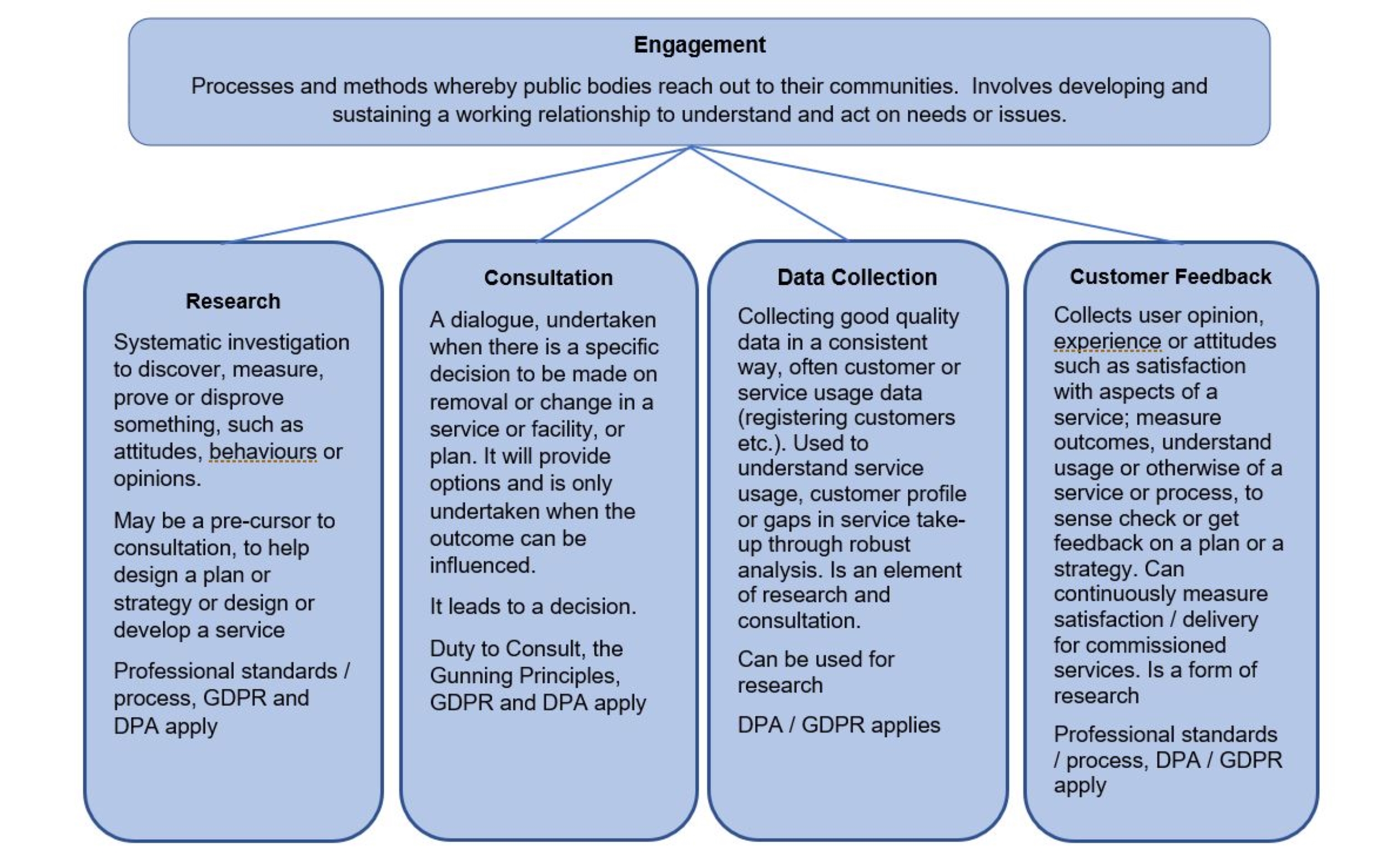
| When is it research? |
|
|---|---|
| When is it consultation? |
|
| When is it data collection? |
|
| When is it customer feedback? |
|
So, when is it consultation?
When there is a specific decision to be made. It is a dialogue or a conversation with those who will be directly affected by that decision.
It is required when there is a duty to consult. This may be:
- a statutory duty, for example, where a particular change must follow a particular process (the terms of statutory consultation are rarely clear, and in many cases, a statutory duty is the minimum you must do)
- a promise to consult (language becomes particularly important on this point – if you say you will consult, then you may create a duty to do so)
- established practice of consultation or expectation to consult, (e.g., have you consulted on this previously, or on something similar, have you promised to consult)
- sometimes, where not to do so would be conspicuously unfair (e.g., when a decision that will have great impact is not consulted upon, nor options considered, nor alternatives considered)
- If you choose to consult even when there is no duty to, the same principles of conducting it, and the same basis for overturning decisions apply
Why research and consultation need to be done properly
- Hull City Council is committed to involving local people in the decisions that affect them. When done properly, research and consultation enable people to make informed decisions and shape the services that affect them
- Hull City Council is committed to evidence-led decision making. Research and consultation should produce evidence which is reliable, trustworthy, and valuable, and which can stand-up to scrutiny
- Legal challenges to public consultations and decision-making have increased markedly over recent years, with courts being willing to intervene where all the requirements of lawful public consultation are not met e.g., robust evidence collection, equality analyses and fair, open, and meaningful consultation
As we said earlier, consultation has a framework, tested in the courts. The council’s standards on research & consultation are based on:
- The Gunning Principles 2001/14
- Cabinet Office Principles
- Case law
- Hull City Town Clerk’s advice
- Market Research Society Code of Conduct
The Council’s Research and Consultation Principles are:
- All research and consultation should be fair
- It should be designed, conducted, and analysed independently of those directly involved in decision-making
- Results should be reported openly, in full
- It must be clear what the research / consultation is about
- It should be done when there is still scope for influence, before a decision is made – what can be influenced and what cannot must be clear
- Information must be concise and relevant, in plain clear English and should present proposals in concrete terms
- Those directly affected should be directly contacted, made aware of the proposals and of the consultation, and enabled to feed back in the manner most appropriate for them. Putting it on a website or in a newsletter is not sufficient
- The most appropriate method(s) for the intended audience(s) should be used – this includes the use of alternative formats and languages, and digital and postal methods – this may mean multiple versions for different stakeholders
- Raise awareness, making it as easy as possible to take part and barriers removed
- Ensure people have enough time and information to give their views
- Research / consult at a formative stage so people’s views can be considered before making decisions and use them in the decision making
- Carefully analyse responses so that results are accurate, reliable and without bias
- Publish results and provide feedback on decisions taken, and next steps
- Monitor and evaluate the effectiveness of research / consultation so that we can continue to improve
- Work in a co-ordinated way within the council and with partners to reduce waste, unnecessary cost and avoid duplication
- Understand what information is already available and use it
- Share results and learning, and be open to scrutiny
To conduct a consultation takes a lot of time, planning and resource (including budget). It can be complicated and difficult.
Ask yourself – Do I need to consult? Do I want to consult? Or email the Insight Team
